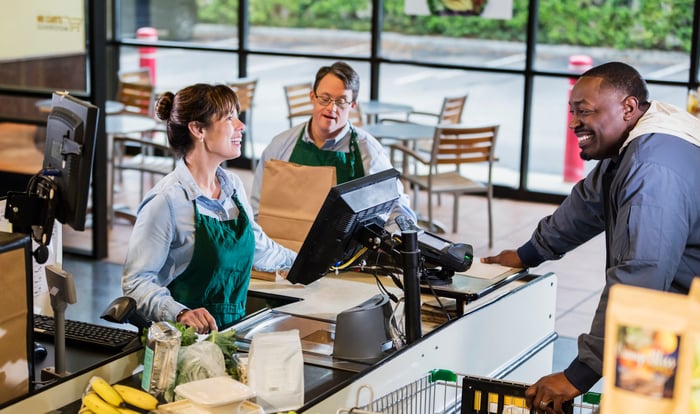Unilever (UL 0.19%) may be a consumer products behemoth with its brands sold across the globe, but its stock is unloved today. The shares are down 23% from their 2020 highs and trading at around the same level as about five years ago.
However, some promising changes are afoot at the U.K.-based company -- and if recent results are any indication, the stock could see a turnaround.
The troubles
Unilever has been a company in transition. That includes shifting from an odd dual listing structure to just a single listing in the United Kingdom, an effort that was completed in late 2020. Meanwhile, in 2019 the company's leadership passed to a new CEO. And the company is dealing with a dissident shareholder that is now on the board of directors, Nelson Peltz. That last move was hastened by Unilever's failed attempt to acquire the over-the-counter healthcare business of GlaxoSmithKline. And those are just the highlights.

Image source: Getty Images.
The consumer staples business itself had been performing in a less than inspiring fashion. To help get things moving again, management sold off some major operations, including the recent divestiture of its tea division. Put simply, there are a lot of moving parts. Since Wall Street prefers certainty over uncertainty, it's little wonder that investors have been so downbeat on Unilever shares.
But things are starting to get more certain. For example, the business overhaul that has been in the making is finally complete. The goal was for decision-making be quicker and to tie pay to actual results. Although it's still early days, the company reported a number of changes that have been facilitated by the new structure during its third-quarter conference call, including a corporate push to cloud-based management systems.
The real story
In many ways, it looks like Unilever is getting its house in order. And having Nelson Peltz on board to help is a net positive, given that he also assisted peer Procter & Gamble in its turnaround effort not too long ago. The key is that change takes time, and Wall Street tends to be impatient.
But if recent results are any indication, Unilever is in a good position to get this transition right. For starters, the company's brand portfolio is very strong. It includes brands like Dove, Ben & Jerry, Vaseline, Knorr, and Hellmann's, among many others. This is not a company that is trying to break into markets -- it is already there, and often in a dominant position.
To put some numbers on the strength here, look no further than the company's ability to push through price hikes in the face of raging inflation. Unilever has increased prices in each of the last four quarters. In the final quarter of 2021 the hike was 4.9%, followed by 8.3%, 11.2%, and 12.5%, sequentially, through the first three quarters of 2022. Through that span, it has, at worst, seen low-single-digit volume declines in each quarter. Unilever clearly has pricing power, and consumers remain loyal to its brands.
Assuming that consumers continue to buy what Unilever is selling, which seems highly likely given the pricing push so far, the company likely has ample time to get itself back into growth mode. There's no way to tell just how long that will take, of course, but it almost doesn't matter given the strength of the underlying portfolio. Six months, two years, more? You can happily collect the generous 3.8% dividend yield on offer today all along the way.
Risk versus reward
With Unilever's stock down so much and the business still fundamentally strong, it seems like the risks here are pretty mild. The company has already survived a few missteps, such as the Glaxosmithkline debacle. If you are a patient dividend investor who thinks in decades, there are silver linings starting to show up on Unilever's clouds, suggesting that now could be a good time to lock in this high-yield stock.





